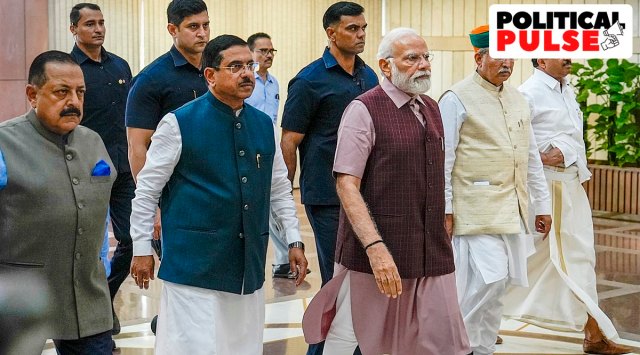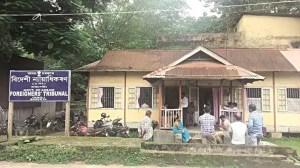
The government is not unduly worried about the disruptions in Parliament either, said leaders, as it has so far managed to get through its legislative agenda smoothly. On Tuesday, the government managed to pass key Bills such as the Multi-State Cooperatives Societies (Amendment) Bill, 2022, and Biological Diversity (Amendment) Bill, 2022, in the Lok Sabha; and the Constitution (Scheduled Tribes) Order (Fifth Amendment) Bill, 2022, which seeks to formalise Bhuinya, Bhuiyan and Bhuyan as synonyms of the Bharia Bhumia community, in the Rajya Sabha.
On Monday too, as the Lok Sabha presiding officers allowed the Question Hour to function at least partially, the government introduced the National Nursing and Midwifery Commission Bill, 2023, National Dental Commission Bill, 2023, and the Constitution (Scheduled Tribes) Order (Fifth Amendment) Bill, 2022 – even as Opposition MPs were shouting slogans in the Well of the House.
Sources within the Opposition admitted some disquiet over the government getting the Bills through without much discussion, even as they stick to the demand that PM Modi himself make a statement on Manipur, rejecting an offer by Union Home Minister Amit Shah to hold a discussion.
Sources said that at a meeting of floor leaders convened by Speaker Om Birla as part of his efforts to end the logjam, at least two parties, the BSP and AIMIM, said they were not insistent on a statement from the PM, but wanted him to be present in the House during the debate on Manipur when it takes place.
An Opposition MP expressed the fear that by disrupting the proceedings they might be falling into a BJP trap, and that the government would only be too happy about getting through Bills which have far-reaching consequences. “The Opposition has not been able to comprehend this strategy of the ruling party,” said the MP.
Story continues below this ad
Another hint of the government strategy was Modi’s scathing attack on the Opposition at Tuesday’s parliamentary party meeting of the BJP, without making any reference to Manipur. Earlier, there had been an indication that the PM might agree to the Opposition demand, on the assurance that he would be heard without any disruptions in the House.
Alongside, the government intends to focus on bringing normalcy in Manipur, so that it can blunt the Opposition’s attack against it over the matter.
Sources said the relaxation regarding broadband services was part of this. On Tuesday, announcing a review of the ban on mobile Internet and the lifting of suspension of broadband services “conditionally in a liberalised manner”, the Manipur government cited “the suffering of the common man” and added that the Internet restrictions “had affected important offices, institutions, health facilities, people working from home etc”.
On Monday, top government sources said they were satisfied with the “progress” in Manipur so far.
Story continues below this ad
On a no-confidence motion, BJP sources cited an instance from the Budget Session of the 16th Lok Sabha in March 2018, a year ahead of the general elections, when the TDP and YSRCP had held continuous protests against the Centre’s refusal to grant special category status to Andhra Pradesh. The two rival parties in the state repeatedly gave notices for a no-confidence motion, and managed to get the required signatures of at least 50 MPs, including from other parties, to table a motion.
However, Speaker Sumitra Mahajan kept citing lack of order to not take up the motion, and kept adjourning the House. “You do not want to run the House. I want to take up the no-confidence motion, but you do not want to run the House. Today is the last day. We will have the National Song, Vande Mataram,” Mahajan finally said on April 6, the last day of that Session.
As per rules, another motion of no-confidence can be taken up only six months after one has been rejected by the House. In the following Monsoon Session of the 16th Lok Sabha, the Opposition tried again. Though the NDA government finally defeated the no-trust motion in the Lok Sabha by 199 votes, the 12-hour raging debate saw Opposition members speak at length on the government’s agriculture and economic policies, and on incidents of mob lynching.
Given the BJP’s overwhelming majority in the Lok Sabha, the Opposition knows the Modi government can’t be defeated and is only hoping for a similar debate this time.
Story continues below this ad
A no-confidence motion to persuade the PM to speak in the House, though, remains a rare move. Since Independence, only 27 no-confidence motions have been moved in the Lok Sabha.
In 2008, when his government faced a crisis over the India-US nuclear deal, then Prime Minister Manmohan Singh had moved a trust motion to prove his government’s majority, and won.

































